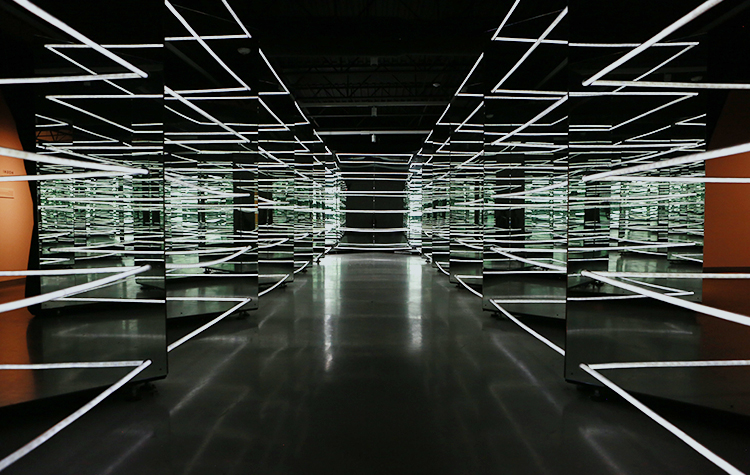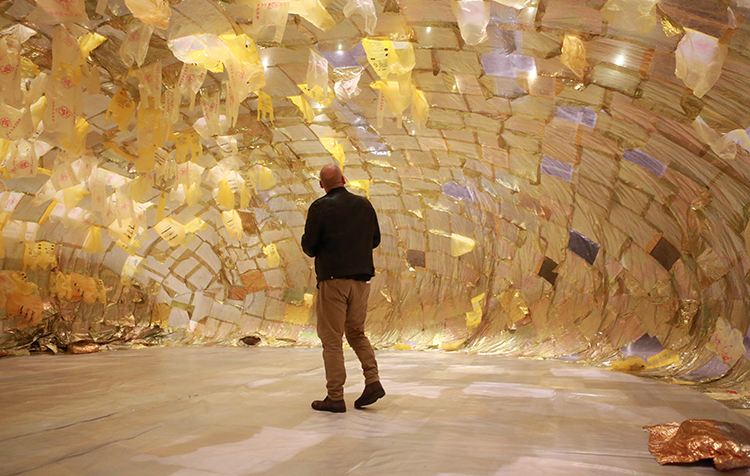
The present changes faster than our capacity to adapt to it. New technology is increasingly a part of our interaction with the world that surrounds us. So, when looking to the future: What capacities will we need for tackling the challenges we’ll face in 2050? At wonnd we challenged a group of 20 international trailblazers from the fields of science, technology, design, art, business and government, all of them changemakers working on different disciplines, to answer this question and we led the discussion regarding their insights and responses!
We designed and facilitated the SXSW Trailblazer Future Lab workshop held on March 11th as part of the SXSW 2022 Festival at the incredible Wonderspaces in Austin, Texas. The workshop was a collaborative initiative between wonnd and Terra Mater Studios, with the inspiration of IdeaSquare, the innovation space at CERN, and the support of the Austrian Economic Chamber of Commerce.

The participants, all of them experts in digitalization, were divided into teams to envision how the future will be. Here are the main takeaways of the session:
- There’s common agreement about the challenges that are already present today, and that are defining the future we will encounter in 2050: global warming, sustainability, population growth, scarcity of resources, global interdependence. The question is: How will we ensure our survival in such an environment?
- What’s more, the digital world is evolving very fast to be another layer of our daily life. Extended reality (XR), NFT, blockchain, cryptocurrencies and the Metaverse have been dominant topics in the conferences, debates and exhibitions at this edition of SXSW.
- Even though technology develops quickly, our human interaction with the universe around us has remained the same since the beginning of evolution: our five senses are the “sensors” that allow us to observe and measure the universe. Many questions were raised on this point: Do we need to expand our capacities to deal with the challenges of the future? What capabilities should we have to plan for an unplannable future? Will we need to develop a kind of sixth sense that helps us expand our abilities to understand the world?
- The conclusions from the four teams coincided: empathy is the sixth sense we need for the future. In a society where connections are mediated more and more by technology, there’s a unanimous vision that we need to re-connect with our existence to understand the impact of our actions in relation with people and nature.
- Even if technology may help, empathy can only be achieved and boosted by education. Educating people about respect, tolerance and equality are key to creating empathy.
Empathy is a popular topic lately; a lot of people are talking about it. You’re probably not even surprised by this. It seems obvious. But when a group of innovators, who mainly work on tech-driven developments and in related industries, agree that the key for the future is in humans’ ability to share others’ feelings and emotions as if they were their own, it’s not!

One of the keys to our approach at wonnd is that we don’t believe in isolated heroic disciplines. And we are glad to see that the conclusions from the discussion among this group of trailblazers confirm this statement: the solutions for the future are multidisciplinary, cross-industry and people-centric. Our capacity to empathize and understand at a systemic level the implications of everything we do is the sixth sense of the future. We still have a lot to do in this direction, and there will be many other workshops to come. As we always say: not everything is done.
We’re very excited to be part of the multidisciplinary team of the Future Lab, which brings together: strategy and multidisciplinary innovation, behavioral change and learning, filmmaking and storytelling. It’s a great team formed by Markus Moosleschner and Luciana Leveratto, with the special support of Oliver Brincat and Chris Packwood from Red Bull. The help and support of Verena Prossegger, Réka Artner and Reanne Leuning have been invaluable!

Cover artwork: HOSHI by NONOTAK Studio.
Photos by Nicholas Brooks. Courtesy of Austrian Economic Chamber of Commerce.